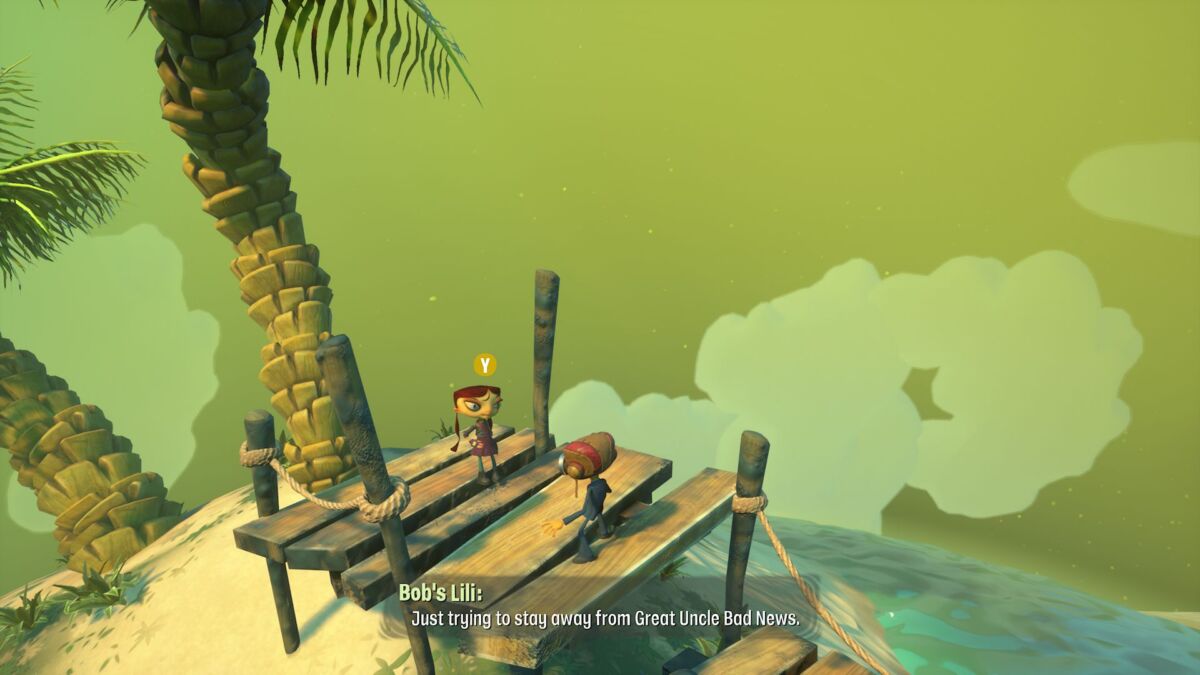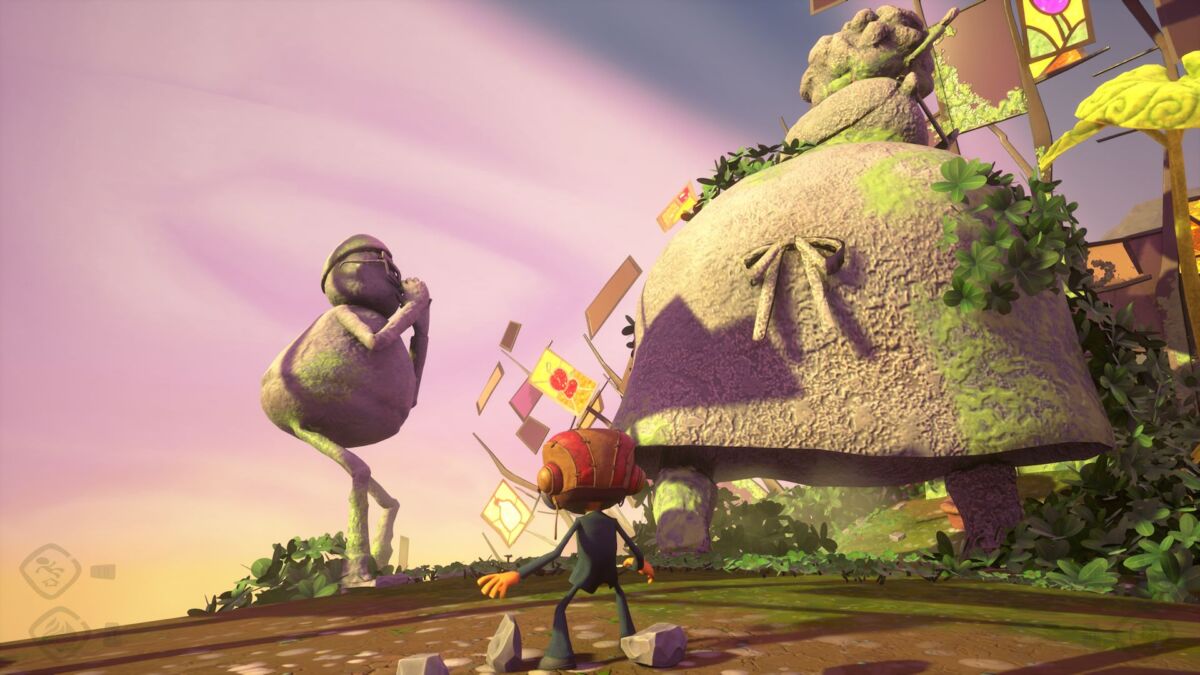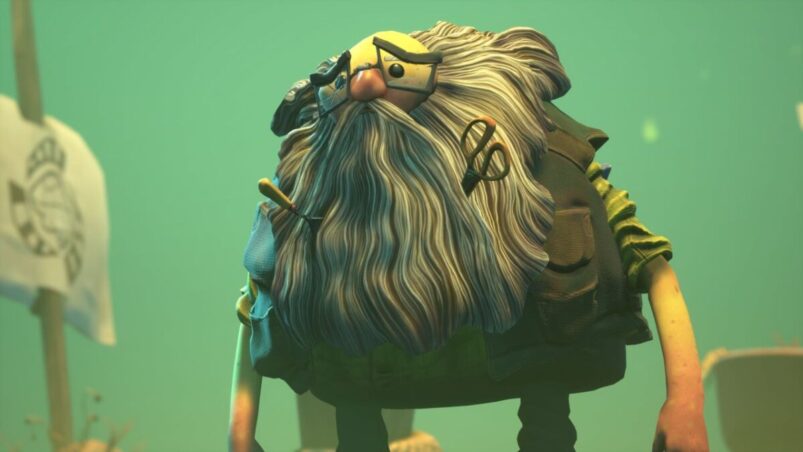You often hear the phrase “what if you were in their shoes?”, but as individuals, it’s still very difficult to get a complete picture of that person’s struggles, perceptions, and mental state. Double Fine’s Psychonauts is a series that asks: “What if you were able to breach that frontier and learn more intimately what that person’s struggling with?”
This premise is fantastic for creating wacky levels for players to jump around in, but it also gets into the psyche of the characters in the game, which opens the door to explore unique mental states that many can relate to.
These can be strange, like going into a conspiracy theorist’s head to hear about his Milkman Conspiracy, or they can be heartbreaking, like Psychonauts 2’s Bob’s Bottles, which explores neglect, substance abuse, and depression better than any game that I have seen before, while still remaining respectful of the subject matter.
Getting Into Bob’s Head

Bob Zanotto was one of the Psychic Six: the original team that pioneered what being a Psychonaut was all about. However, in the aftermath of the Battle of Grulovia, Bob disappeared from public view, his location seemingly unknown.
That is until Ford Cruller suggests that Raz get as many of the Psychic Six back together by investigating Green Needle Gulch When Raz enters Bob’s greenhouse, a plant throws a bottle at him, and Bob takes a swig from a flask. He’s alive, but not looking his best.
Raz tries to talk to Bob about getting the gang back together, but Bob says he “never wants to hear those names again. They’re all…lost…dead.” Bob comes off angry and distant, and it’s obvious that something has happened to cause such a reaction, but Raz has no idea yet what that could be. Bob even refers to himself as “dead” and tries to appear content to waste away in seclusion with only his plants as company.
He is all alone and pushing other people away who are trying to help him, and there are indications that he may have a serious drinking problem based on the number of unmarked bottles scattered around his greenhouse. He is stuck in his own vicious cycle of loneliness, addiction, and depression.
Raz gets thrown out of the greenhouse, but Bob’s plant ushers Raz back in, obviously worried for its human friend. The plant gingerly turns Bob back toward Raz, and all the fire from Bob’s eyes is gone. He used up what little energy he had left to push Raz away but after seeing he failed, he resigns himself to whatever judgment he believes is waiting for him when Raz sees his psyche.
The Scattered Islands

Upon entering Bob’s consciousness, Raz finds Bob tending to a dead garden on an island all by himself. Bob has stranded himself and is too afraid to leave the tiny island’s shores to venture out beyond this one viewpoint. Raz notes that the plants Bob is tending on the island are dead and asks about the garden.
Bob is absent-minded and can’t seem to focus or remember where the seeds for growing strong plants could be. Bob is continuing to exhibit symptoms of depression, such as memory and concentration troubles. Raz doesn’t push him into remembering, but instead volunteers to venture out into Bob’s psyche to find where his seeds might be, and it’s in these uncharted waters that Raz will find how Bob views himself and why this may have occurred in the first place.
On neighboring Islands, Raz finds familiar faces like Otto Mentallis, Truman Zanotto, and Lili. When Raz talks to the fellow Psychonauts, Otto shuns the idea of being on good terms with Bob. Truman too says he wants nothing to do with Bob, but it isn’t until Raz finds Lili that it becomes clear that these are merely projections of Bob’s perception and not based on real experiences or facts.
Lili’s voice is lower than it should be, and she admits that Bob has only seen pictures of her. Lili is obviously someone important to Bob and someone he wants to meet if she’s located so close to his own island, but he’s too scared of reaching out to her or anyone else. He has convinced himself that these subjective perceptions are true, which only encourages his self-destructive behavior and isolation.
Some islands have bottles that Raz must uncork and travel through to progress. These bottles explore fragments of memories that Bob has tried to repress or “bottle up” and throw out to sea. The distorted memories represent some of the most significant moments in Bob’s life, but that makes them all the more painful in retrospect.
The first bottle takes Raz to the kitchen of Bob’s childhood home that Raz will walk through several times during these visits. There are two figments in the kitchen: an old woman and a bottle of booze. Figments are representations of the person’s imagination that help to illustrate what that person associates with the setting and circumstances. Here, the player can see that alcohol had an impact on Bob’s adolescence too.
His mother also had an alcohol problem, one that would help to make Bob feel isolated at home from his only immediate family. Exposure to this behavior as a child can increase the chances of substance abuse in the future, which might partially explain Bob’s future habits.
The neglect that Bob suffered from his mother as a result of her alcoholism can be seen in the stone garden where her back is always to him: A literal stone-hearted representation of his mother that shows that he didn’t associate her with kindness or support.
And the same kitchen that Raz originally came through becomes more and more dilapidated as the level progresses. Plates begin to stack all the way to the ceiling, cabinets are falling apart, and tiles have plants growing up through them. The kitchen isn’t nearly as warm and welcoming, but decrepit and filthy. This neglect in real life can lead to low-self esteem and mental health struggles, including depression and substance abuse.
Later on, Raz comes to a lake where alcohol bottles are lying beneath the surface of the murky water, and “Bulb Bob,” another representation of Bob’s self, is burping incessantly. This further indicates Bob’s constant drinking and the bottles that have always been a part of Bob’s life in one way or another.
Another bottle that Raz travels to depicts Bob’s marriage to Helmut Fullbear. It might seem weird that a potentially happy memory has been bottled up, however, things begin to take a turn when Bulb Bob burps and sends a crack through the giant statue of Fullbear, breaking his face and revealing Fullbear’s skull.
If the player found the memory vault earlier in the level, they would’ve seen that Bob blames himself for the death of his husband in the Battle for Grulovia. This crack at the ceremony represents Bob’s feelings that he had failed Fullbear and that guilt resides in the day he made his promise to love his husband forever. He’s taken the entire weight of that loss on himself, and the once happy memory of his marriage has turned into a reminder of his guilt.
It’s revealed in one of Bob’s repressed memory bottles that his perception of this blame wasn’t helped when, after having been asked to seek help for his mental health, Truman had to fire Bob from the Psychonauts, which completed his self-isolation while only adding to the group of people that he felt that he’d let down. He had nowhere else to go but inside himself since he was unwilling or unable to seek help.
Finally, Raz overhears the vows that Bob said to Fullbear, and they confirm that Bob has always had a tendency to think less of himself and others: “I used to think that I loved plants more than people until I met this man.” Fullbear made Bob feel truly loved, which allowed him to be more willing to give other relationships a chance — that all began unraveling when Bob felt he was to blame for Fullbear’s death. He regressed and slipped into isolation and took up his mother’s self-destructive practices.
An Empathetic Approach

During this entire adventure, Raz is nothing but patient with Bob. He doesn’t pass judgment on the alcohol abuse, he doesn’t comment on the memories of Bob’s mom, and he doesn’t try to push Bob into anything. Instead, he tries to meet Bob halfway and retrieves the seeds.
This is such an understated point in the game that can’t be overlooked. Depending on the situation, a stranger can’t push someone into something they aren’t ready for. For instance, when Raz first arrives and asks Bob to come with him across the ocean, Bob is scared of leaving the island, so he stays behind, and Raz says that’s okay.
He never insists or pushes this man, who is clearly hurt and distrustful of the world, to travel across waters he isn’t ready to cross. Raz, instead, listens and learns about Bob’s history and does his best to accommodate and help him to begin to see the world in a different light.
Raz does allow Bob’s biggest traumas to take root once again after he retrieves the final seed. However, Raz stays by Bob’s side and helps him see that the only way that he can begin to improve is by confronting his feelings about his mother, his perceived betrayal from Truman, and his guilt regarding Fullbear. By learning to accept these feelings rather than keeping them bottled up, Bob is taking his first step in healing.
These past feelings manifest themselves as a boss fight that Raz is able to walk Bob through initially to get him to a comfortable state where he felt he could deal with his painful memories by himself. Raz points out that there are far more seeds that need to be tended to that are floating closer and closer to Bob’s island.
At this, Bob says, “I’ll just take ‘em one at a time.” He isn’t going to get overwhelmed by these past memories and neglect to deal with them or himself anymore. He’s going to tend to them, learn, heal, and hopefully grow a little bit himself.
This was such an important point in Bob’s recovery, and by the end of the level, Bob is beginning to be more critical of the perceptions he created of others in his head. He’s even cleaning up the greenhouse and throwing away all his alcohol.
This is, of course, a very speedy recovery for someone who might have been suffering from heavy alcohol use and major depression, but it’s a game where you are jumping into someone’s psyche — creative liberties are acceptable. In real life, recovery can have ups and downs and can take a whole heck of a lot longer, or it can just be something that the individual learns to cope with in a healthier way.
Psychonauts isn’t trying to show players the timeline of mental health as much as it’s trying to give players a basic understanding of mental health’s impact on the self and others. It portrays mental health as a crucial part of someone’s overall health and how it can impact their entire worldview while at the same time being incredibly respectful of the process and the people trying to cope.
It’s an important lesson and one that’s so uniquely handled in Psychonauts 2, showing that, above all else, mental struggles look different for everyone, and remaining respectful of someone else’s journey is crucial for any kind of progress.
READ NEXT: Silent Hill And Its Relationship With Mental Health
Some of the coverage you find on Cultured Vultures contains affiliate links, which provide us with small commissions based on purchases made from visiting our site.

